 |  |
The following text is a short-story about Punk. The content is based on personal experiences plus publications from/about this time, like fanzines and books.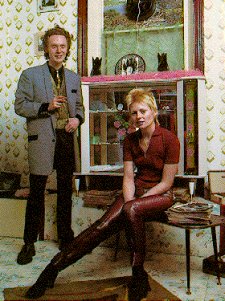 Kings Road, London, October 1971 : Malcolm Robert Andrew Edwards (aka Malcolm McLaren) and Vivienne Westwood moved into the back of the shop in number 430.
Kings Road, London, October 1971 : Malcolm Robert Andrew Edwards (aka Malcolm McLaren) and Vivienne Westwood moved into the back of the shop in number 430.McLaren and Westwood were greatly impressed by the Teds style. It was Vivienne Westwood who quickly found that these Teds had to get all their clothes hand made and there was a gap in the market. They took over the shop, called it Let it rock and began to exploit this gap! McLaren was in the sixties student at Croydon Art School. 'I learnt all my politics and understanding of the world through the history of art', he sayed. McLaren began to try out ideas: 'Plagiarism is what the word is about. If you didn't start seeing things and stealing because you were so inspired by them, you'd be stupid'. At Croydon he met Jamie Reid another art-student, who made some years later covers and posters for the Pistols records. The riots that occured in Paris during May 1968 got also attention in London. Their cryptic phrases were the perfect medium for this revolt. The magazines of the Situationist International (SI) collected in a special technique - as the dadaists ages ago - the graffiti and posters of the student protest. SI material was also available at London bookshops, where McLaren found and bought it. He had also contact to a London-group of situationists called King Mob. Through this influence he and Jamie Reid developed their taste for new media practise. In just over two years - with an exhibition of their clothes-designs in New York and contact with the local music-scene - McLaren and Westwood had learned how subcultures work. They had seen how those interacted with the media, music and fashion industries. Both felt that it was the time to start connecting this experience with their own ideas. They started to gather friends with specific skills around them. Vivienne wanted to expand the T-shirts to take on more complicated ideas, mixing sexual taboos with situationist slogans. Bernard Rhodes (later manager of the Clash) was an ideal colleague with practical skill of printing and his interest for minimalism and dadaism. At the end of 1974 McLaren traveled back to New York. He tried to give the New York Dolls a new image with clothes made by Vivienne Westwood. A mix of fashion, sex, communist sign and slogans. But it was to political for the NY music-scene. The Dolls splitted up and a new generation of bands occupied the clubs: Richard Hell and his group Television, the Ramones and Patti Smith whome regarded McLaren as urban poets. 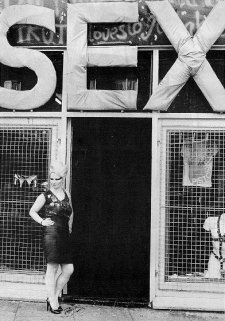 While McLaren was in New York, Vivienne Westwood had to establish the new identity of the shop. She sloganised her designs as clothes for heroes and connected the wearing of them with the expression of an attitude. They changed the name of the shop to SEX (changed 1976 to SEDITIONARIES and 1981 to WORLDS END).
While McLaren was in New York, Vivienne Westwood had to establish the new identity of the shop. She sloganised her designs as clothes for heroes and connected the wearing of them with the expression of an attitude. They changed the name of the shop to SEX (changed 1976 to SEDITIONARIES and 1981 to WORLDS END).But McLaren and Westwood understood that it wasn't enough to have a name and ideas: They needed to be translated into physical form. With the arrival of Jordan, they gained a front-women who was a living advertisement for the new shop. She was the first Sex Pistol! McLaren returned to London in May 1975 and he was impressed by Jordan's appereance and the way in which a few teenagers were incorporating the shops clothes into their look. One of the regularly visitors was Steve Jones a guitar-player in a band called 'The Strand' (after the Roxy Music song). Other members were Paul Cook and for a temporary time Warwick Nightingale. They needed a Manager and McLaren had looked for a band to made his - NY inspired - vision true. As one day McLaren went to hear them, he saw a group that had no permanent bassist and no stage presence. The first thing to do was to find a bass-player. McLaren found one in Glenn Matlock, a student who used to help out in the shop on saturdays. Then McLaren was looking for a special front man to form his ultimate garage band. John Lydon was coming often into the shop. He was first approached by Bernard Rhodes (the later Clash manager), who was struck by his green hair and the ripped-up and sticked by safety-pins Pink Floyd T-shirt with the slogan I hate over it! Responding to Rhodes' enthusiasm McLaren asked him if he could sing and Lydon replied: 'No only out of tune and anyway I play the violin' ... and the Sex Pistols were complete. | ||||||||||||||||||||||||||||||||||||
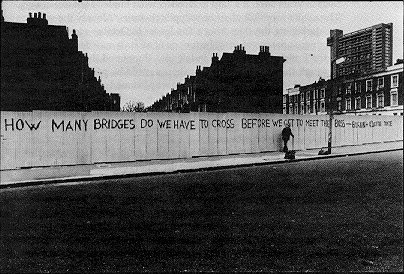 In 1975 England was in a deep recession, the number of unemployees was the worst since the Second World War. School-leavers were among the most vulnerable. The public spending had risen to 45 percent of the national income. At this time state-control - through nationalized industries and a vast bureaucracy - seemed to be on the way to Orwell's 1984! In February 1975 Mrs Thatcher became Conservative Party leader and began to propagate her ideology based on the primacy of the individual (or better egoism). Slogans with messages as SAME THING DAY AFTER DAY - TUBE - WORK - DINER - WORK - TUBE - ARMCHAIR - TUBE - WORK - HOW MUCH MORE CAN YOU TAKE - ONE IN FIVE CRACKS UP were painted on walls.
In 1975 England was in a deep recession, the number of unemployees was the worst since the Second World War. School-leavers were among the most vulnerable. The public spending had risen to 45 percent of the national income. At this time state-control - through nationalized industries and a vast bureaucracy - seemed to be on the way to Orwell's 1984! In February 1975 Mrs Thatcher became Conservative Party leader and began to propagate her ideology based on the primacy of the individual (or better egoism). Slogans with messages as SAME THING DAY AFTER DAY - TUBE - WORK - DINER - WORK - TUBE - ARMCHAIR - TUBE - WORK - HOW MUCH MORE CAN YOU TAKE - ONE IN FIVE CRACKS UP were painted on walls.The music-business was dominated by expensive (over)produced Pop and 'progressive' Rock. The hopes of the early seventies, David Bowie and Roxy Music, changed their image with every album release into a more commercial style. But they made the first postmodern records and the attempt to create a new pop-generation. Style not only music was important. It was the sensibility and combination of fashion, art & music based on works of Andy Warhol and Velvet Underground, George Orwell and Stanley Kubricks A Clockwork Orange. In 1975 new bands had no chance to produce and promote their records until McLaren began to manage the Sex Pistols. He organized the first concerts and for some months they toured the country. There weren't many people at the performances, but from the very beginning the Pistols polarized their tiny audiences and at each concert one or two people followed them. Some of them built later their own groups like Chrissie Hynde (Pretenders), Viv Albertine (the Slits), Joe Strummer and Mick Jones (the Clash), Howard Trafford (aka Devoto: the Buzzcocks, Magazine), Peter McNeish (aka Shelley: Buzzcocks), Peter Hook and Bernard Sumner (Joy Division, New Order), Morrissey, Tony James (Chelsea, GenerationX), Adam Ant, Bruce Gilbert (Wire), and others. In July 1976 the Sex Pistols recorded seven songs with Dave Goodman on a four-track machine. These were Anarchy in the UK, Pretty Vacant, Seventeen, Satellite, Problems, I wanna be me and Submission. With these tapes McLaren made his first assault on the music industry. But the primary purpose of the companies is to take money and at that moment they didn't see any chance to earn it from Sex Pistols records. McLaren decided to hold another big event at Islington's Screen on the green. At the end of August the Midnight Special pulled together the Buzzcocks, the Clash and the Sex Pistols in Punk's first metropolitan test of strength. Waiting for all three groups were not only the fans but also journalists, photographers and A&R men. The Pistols, especially John Lydon made a totally different performance as the other two bands and got the main-attention of the media. 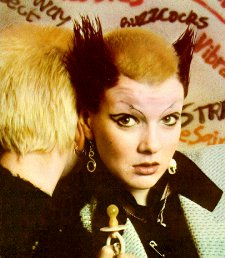 In this time a Pistols concert plugged them together with a group of teenage stylists, who created a subcultural ambience around the group: the Bromley Contingent!
In this time a Pistols concert plugged them together with a group of teenage stylists, who created a subcultural ambience around the group: the Bromley Contingent!Caroline Coon wrote in the Melody Maker about the punky bands and Mark Perry published the first fanzine called Sniffin Glue (from a Ramones song) and announced itself to be FOR PUNKS. The idea behind this first fanzine was more important than the contents: Anybody with a certain command of english and a few pounds (for photocopying) could publish their own statements. Than McLaren and his team of Glitterbest organized the Punk Festival at the '100 Club' in London. There was a vacant space and it has been discussed between McLaren and members of the Bromley Contingent. Siouxsie answered: 'We've got a band'! 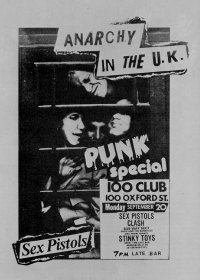 Siouxsie & the Banshees with Sid Vicious drums, Marco Pirroni guitar, Steve Severin bass and Siouxsie Sioux vocals. So they gave their first concert with the Sex Pistols on 20th September, the Clash and Subway Sect; on the 21st, the Damned, Vibrators with Chris Spedding, Buzzcocks and Stinky Toys from France.
Siouxsie & the Banshees with Sid Vicious drums, Marco Pirroni guitar, Steve Severin bass and Siouxsie Sioux vocals. So they gave their first concert with the Sex Pistols on 20th September, the Clash and Subway Sect; on the 21st, the Damned, Vibrators with Chris Spedding, Buzzcocks and Stinky Toys from France.Attempting to work on songs at this late stage was obviously impractical, but setting the Lord's Prayer to a barrage of improvised sound was not. Add a few lines from songs like Twist and Shout and Knocking on Heavens Door and the performance was complete. The Banshees had taken the idea that 'anybody could do it', as Sid Vicious said 'Just pick a chord, go twang and you've got music'! The Pistols played there one of their best performances and every present person felt that it was enough power for a big explosion. Small eruptions of this energy were at most of the Pistols-concerts, throwing beer-glasses to the stage, spitting and brawls in the audience but also with band-members. The result was that the Pistols were banned from many clubs. After the Punk festival the record company EMI signed the Sex Pistols. Two days later the band went into a studio to record their first single Anarchy in the UK and on 27.November EMI released the single. Then on the evening of 1.December the Sex Pistols had the chance for an appearance on the local London TV show Thames Today presented by Bill Grundy. The Pistols had brought also four of the Bromley Contingent (Siouxsie, Simone, Steve and Simon) with them. A drunken Grundy provoced the eight and got corresponding answers with rude words and grimaces (transcript of the dialogue). Too much for a 'serious' TV show and dumb TV-watchers and enough to catch all the press-headlines the next day. Before the TV-show Punk was just 'bad' music, after it the media-theme. And further reaction for the Pistols: they were banned from playing thirteen out of nineteen tour-dates, most commercial radio stations were refusing to play the Sex Pistols, record-chains stoped selling the single and at least EMI cancelled the contract with the band. | ||||||||||||||||||||||||||||||||||||
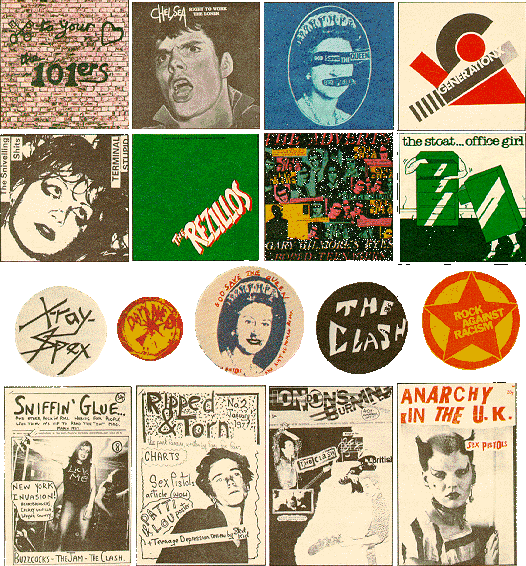 | ||||||||||||||||||||||||||||||||||||
| But Punk couldn't be stopped at this time. A lot of new Punk-bands were born and played in various clubs in every greater city. New fanzines and, as one of the great Punk-innovations, new record-labels and distributors (f.e. Rough Trade) were founded. This small and independent companies linked together with record-shops, live-clubs and fanzine-writers in UK - and a bit later also in the rest of Europe and the USA - and gave the bands the necessary infrastructure to publish and promote their own records! But also every major-company signed a Punk-band like CBS the Clash and Island the Damned. Both groups recorded their first albums and published them the following months. After three months without a record-contract the Pistols signed with A&M Records in front of the Buckingham Palace. Now with Sid Vicious - an old friend of John - on Bass who replaced the sacked Glen Matlock. The first single for A&M had already been decided: It should be the song that John had written for the Queen's Silver Jubilee: God save the Queen. The record-cover, the posters, handbills, adverts and stickers were designed by Jamie Reid. As 25'000 copies of the singles were being pressed, the company got in panic about the consequences of this release and they finished the contract too after eight and a half weeks. On 10th April after a free Pistols concert at the Roxy Club with the Slits Virgin became interest on the Pistols and they signed a record contract. The promotion plan for God save the Queen continued and the single came out just two weeks before the official ceremony. The record went on sale on the 27th May 1977 and sold 150'000 copies in five days, enough to send it into the charts at number eleven. The world took notice! God save the Queen was shocking, not only because it said the present was a lie but also because it prophesied a dreadful future: No future for you and me! By the time of the Jubilee weekend the Pistols became no possibilities to play in a club. So McLaren decided to hold a promotional performance on the River Thames. He hired the boat Queen Elizabeth for sunday and the Pistols with their followers catched the boat and began to play on the top-deck. During the second song two police launches began to circle the Pistols-boat and then they had to move to a landing stage where massed policemen waited for the boat. By the time the boat docked, the situation got over in chaos. The police began to manhandle members of the audience and a struggle developed. Eleven people among them Vivienne Westwood, Jamie Reid and Debbie and Tracy from the Bromley Contingent resisted the police-pressure and were arrested. By the end of the Jubilee week, God save the Queen had sold 200'000 copies and reached number one in the charts. This was the bands peak. They released the next single Pretty Vacant and the group made a Scandinavia-tour. | ||||||||||||||||||||||||||||||||||||
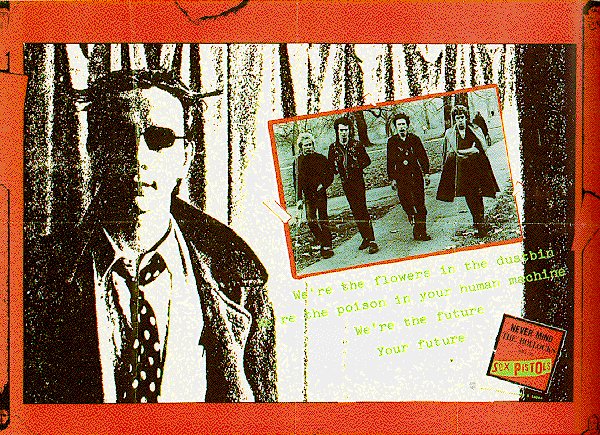 | ||||||||||||||||||||||||||||||||||||
| After a short tour through Dutch they got back to London because they had to go on a US-tour to promote their album. The Sex Pistols arrived in New York on 3rd January 1978. Before the groups' departure, Sid Vicious had built up a considerable dependency on heroin. He was uncontrollable and had to be watched twenty-four hours a day. There were many hassles within the group and with McLaren, the band-members weren't speaking to each other. Jones and Cook were hanging out together, Lydon would have nothing to do with McLaren and Sid was on cold turkey. They made a great first concert in San Antonio but with every next gig things were reaching the breaking point. They travelled seperately, Jones with Cook and McLaren by airplane and Lydon with Vicious by car. On 14th January 1978 they gave the last concert at the Winterland in San Francisco. The sound was terrible, everyone was completely miserable and after some songs Lydon suddenly stoped: 'Oh bollocks, why should I carry on?' Cook and Jones continue the riff ... for the remaining minutes, Lydon didn't speak to the audience but to himself: 'There's no fun in being alone / this is no fun / it is no fun at all'. He seated on the stage and looked emptily at the crowd: there was no performance, there was no audience and there was no Sex Pistols! Then at least he said: 'Ever get the feeling you've been cheated'! After this show the Sex Pistols went their separate ways. Cook, Jones and McLaren drove off to Los Angeles before going to Rio. On the 18th January John Lydon arrived in New York and announced the groups break-up. At the 2th February Sid Vicious died on a overdose of heroin in New York. With the end of the undoubted figureheads, the (first) chapter of Punk was also finished. But this great two years were long enough to generate a new youth-culture - with their own music, fashion, magazines and record-labels! By 3rd May 1979 the conservative-party won the election and Mrs Thatcher moved to Downing Street Number 10! This 'victory' did mark an end to the period of social unrest which Punk had charted so intimately. Humpty Dumpty had fallen off the wall and there was no way of piecing him together. Punk was at the end, but it intiated also some good things. The innovative elements of Punk were:
Records as f.e.
Poems by John Cooper Clarke Movie 'Jubilee' by Derek Jarman with Jordan and other early Punks | ||||||||||||||||||||||||||||||||||||
| ||||||||||||||||||||||||||||||||||||
| > A short history about Swiss Punk & Wave |
| Top of Page | Home-Page | Vivienne Westwood | Jamie Reid | ||
| Wechseln zur deutschsprachigen Version | Copyright © 1995-dato by mital-U | ||